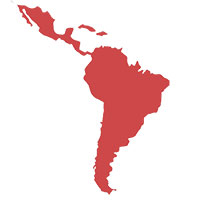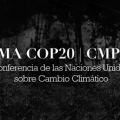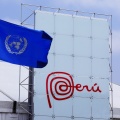Last year’s COP in Warsaw, Poland received a lot of civil-society criticism for its innumerable corporate sponsors and harsh conditions for protestors. From the start It was clear, COP President and Peruvian environment minister Manuel Pulgar-Vidal is seeking to change that. He used the first day to announce that he would make Lima the most open and inclusive COP “in history” and “recognised as the COP that made the decision to include more actors and sectors.” Examples range from allowing civil society observers to provide interventions early on so that their voices would be elevated, to establishing a long overdue official mechanism for Indigenous peoples to gain formal access to and participate. However, some believe that this goodwill by the COP president has given Peru a “free pass” from criticism of a recent shoddy record on climate and the environment.
Despite the “momentum” coming off of September, a UNFCCC intercessional meeting of the ad-hoc working group on the Advanced Durban Platform (ADP), in October, made almost no progress in codifying a draft text for Paris. This means that There is much to be done in Lima.
This intense focus on a new deal in Paris has unfortunately distracted attention from improving ambition before 2020. When asked what were the key elements needed to make Lima a success, COP President Pulgar-Vidal told The Verb that it is necessary to come out of Lima with an ADP draft text.
Other key elements were: “clear up front outcomes” of what Intended Nationally Determined Contributions (INDCs) should contain, an agreement on finance, and a “ratchet up” mechanism to ensure adequacy in emissions reduction and other goals over time.
The main squabble over the ADP draft text has been the timeframe for pledging cycles. A shorter timeframe is preferred as it doesn’t lock-in inadequate targets for the long term and offers opportunities to build political pressure for countries to increase their various pledges. The United States and the Least Developed Countries (LDCs) are pushing for a simple five-year review period. On the other end of the spectrum, Japan, Canada, and Mexico are lobbying for a 10-year-period. There are also some intermediary proposals — like a five-year pledge with an “indicative” 10-year goal, or a 10-year commitment with intermediary review. The US siding with LDCs in favour of more climate ambition is certainly a new flavour de jour.
On finance, this past week’s most interesting development draws upon a familiar tension that we’ve all grown accustomed to — the developed versus developing country divide. The ADP co-chairs have proposed a “non-paper” as the basis for negotiations around finance, a proposal more palatable to developed countries. An alternative proposal was put forth on Thursday bythe Africa Group with the G77+China group supporting it, along with other developing countries.
Of the two, only the Africa Group’s proposal has any legal status in the negotiations parties. Countries like New Zealand, Switzerland, and the US are still insisting on proceeding on the basis of the “non-paper” though because, as the US said: the document has been “very helpful for us.” Avoiding the topic of “resource mobilisation” for developed countries, excluding quantified finance targets, and expanding finance responsibilities to “all Parties” — as the “non-paper” does — would be very helpful to the US, indeed.
Even if global warming is kept to below the agreed upon 2ºC threshold, the world will need US$150 billion annually by 2025 and as much as $500 billion by 2050 to fund necessary adaptation to now unavoidable changes in our earth system, according to a timely report by the United Nations Environment Programme (UNEP). This was dovetailed by Saturday’s report from Oil Change International, which showed that current annual global subsidies for fossil fuel exploration alone almost triple the paltry $10 billion currently pledged to capitalise the Green Climate Fund, which helps developing countries mitigate and adapt to climate change.
And that’s the first week of COP20. The real question now though is what’s on the horizon for the final moments of this week? For starters, we predict even more chaos.
The second Monday has seen the pace of negotiations significantly pick up as ministers and senior negotiations sweep into Lima. With a venue soon to be bursting as its seams, it’s easy to be overwhelmed. But don’t fret! The Verb team will be filtering through the garble, so you don’t have to throughlive-tweeting the action and pushing out the stories that matter.
Substantively, the negotiators are discussing a new draft ADP text today and there will be a no-holds-barred “high-level ministerial” on Wednesday. Specific textual issues that must be covered are transparency and accountability in INDCs, whether there will be an “ex ante” assessment of INDCs after they come in this June to evaluate their adequacy, and what the legal status of a Paris deal will look like.
Pulgar-Vidal stressed that, due to insurmountable political realities in key countries to the negotiations, the legality status of the Paris deal should not be the primary concern. Instead, the priority should whether its components and structure are ultimately sufficient to put us on the path towards the desired outcomes over time.
Thursday will see a high-level ministerial on finance, where negotiators will have to reconcile what text to move forward with, that of the co-chairs or the Africa Group’s.
Week two began with a powerful “Solidarity Not Sympathy” action to recognise Typhoon Hagupit now sweeping through the Philippines. Hopefully this tragedy can give allies of climate justice in the negotiations some moral leverage in Tuesday’s continued consultations on the Warsaw Mechanism on loss and damage.
Given that this is the third consecutive year that a devastating typhoon has struck the Philippines during the negotiations it’s clear that some costs of climate change are already unavoidable.
Even if these “key elements” are not achieved, Pulgar-Vidal stressed that: “We don’t want to recreate what we experienced in Copenhagen by putting too much pressure on the process. We should avoid the sense of frustration and anxiety.”
It sounds rational, and it’s politically adept for the President of COP20 to not want to make Lima a “make-or-break” moment. But for the people of the Philippines and other highly vulnerable countries, the key elements being negotiated here are more than “make-or-break” — they are life or death.













comment